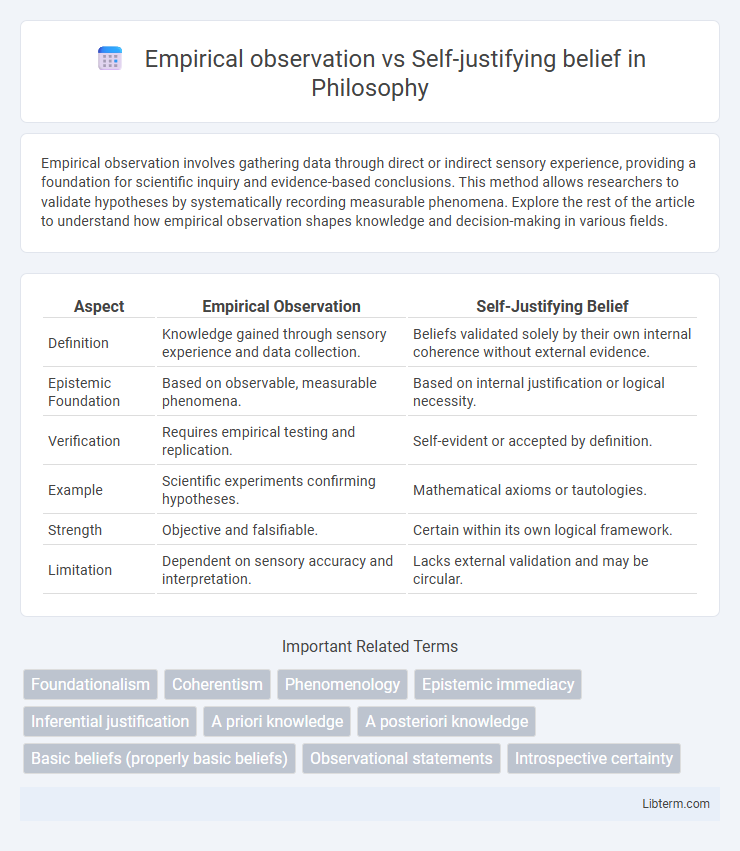Empirical observation involves gathering data through direct or indirect sensory experience, providing a foundation for scientific inquiry and evidence-based conclusions. This method allows researchers to validate hypotheses by systematically recording measurable phenomena. Explore the rest of the article to understand how empirical observation shapes knowledge and decision-making in various fields.
Table of Comparison
| Aspect | Empirical Observation | Self-Justifying Belief |
|---|---|---|
| Definition | Knowledge gained through sensory experience and data collection. | Beliefs validated solely by their own internal coherence without external evidence. |
| Epistemic Foundation | Based on observable, measurable phenomena. | Based on internal justification or logical necessity. |
| Verification | Requires empirical testing and replication. | Self-evident or accepted by definition. |
| Example | Scientific experiments confirming hypotheses. | Mathematical axioms or tautologies. |
| Strength | Objective and falsifiable. | Certain within its own logical framework. |
| Limitation | Dependent on sensory accuracy and interpretation. | Lacks external validation and may be circular. |
Defining Empirical Observation
Empirical observation refers to the systematic collection of data through direct sensory experience and measurement, forming the foundation of scientific inquiry and evidence-based conclusions. It relies on observable, verifiable phenomena to test hypotheses and refine knowledge, contrasting sharply with self-justifying beliefs, which are held without external validation. The rigor of empirical observation ensures objectivity and repeatability, essential for distinguishing factual information from subjective assumptions.
Understanding Self-Justifying Belief
Self-justifying belief relies on circular reasoning where a person uses their belief as evidence to support itself, often ignoring contradictory empirical observation. This cognitive bias strengthens subjective validation, making individuals resistant to external facts and objective data. Understanding self-justifying belief requires analyzing how personal assumptions override empirical evidence in shaping convictions.
Foundations of Knowledge: Empiricism vs Rationalism
Empirical observation relies on sensory experience and evidence as the foundation of knowledge, emphasizing that understanding arises from direct interaction with the world. Self-justifying belief, rooted in rationalism, asserts that certain knowledge can be known a priori through reason alone, independent of sensory input. The debate between empiricism and rationalism centers on whether knowledge is primarily derived from observable data or innate reasoning processes.
The Role of Evidence in Empirical Observation
Empirical observation relies on objective evidence collected through sensory experience and experimentation to validate hypotheses and inform scientific knowledge. Evidence plays a crucial role in differentiating empirical observation from self-justifying belief, as the former demands reproducible and falsifiable data, whereas the latter depends on subjective reasoning without external verification. Consistent empirical evidence enables the correction of errors and the refinement of understanding, ensuring beliefs are grounded in observable reality rather than personal bias.
Cognitive Bias and the Roots of Self-Justifying Belief
Empirical observation relies on objective data and sensory evidence to form conclusions, whereas self-justifying beliefs stem from cognitive biases such as confirmation bias and motivated reasoning, which distort perception to uphold existing views. The roots of self-justifying belief lie in psychological mechanisms designed to reduce cognitive dissonance and protect self-esteem, leading individuals to favor information that reinforces their beliefs while dismissing contradictory evidence. Understanding these biases is crucial for distinguishing between evidence-based knowledge and beliefs maintained through subjective justification.
Case Studies: When Observations Clash with Preconceptions
Case studies reveal that empirical observation often challenges self-justifying beliefs by providing objective data that contradicts preconceived notions. In clinical psychology, for example, therapists relying on self-justified theories may overlook patient behaviors documented through systematic observation, leading to biased conclusions. These clashes emphasize the importance of evidence-based practice, where empirical findings guide decision-making rather than confirmation bias.
Consequences of Ignoring Empirical Evidence
Ignoring empirical evidence often leads to the persistence of self-justifying beliefs that reinforce cognitive biases and misinformation. Such neglect can result in faulty decision-making, undermining scientific progress and practical problem-solving across disciplines. Over time, this impacts public policy, healthcare outcomes, and educational standards by promoting unverified assumptions over data-driven conclusions.
Self-Justification in Everyday Reasoning
Self-justification in everyday reasoning often leads individuals to interpret information in ways that reinforce their existing beliefs, disregarding empirical evidence that contradicts them. This cognitive bias strengthens false convictions by selectively filtering data and rationalizing decisions to maintain internal consistency. Such behavior impedes objective analysis, causing persistent errors in judgment and reducing the accuracy of personal and social decision-making processes.
Bridging the Gap: Integrating Observation and Belief
Empirical observation relies on measurable, objective data collected through sensory experience or experimentation, providing a foundation for validating knowledge claims. Self-justifying belief, rooted in subjective conviction, often resists external evidence, creating challenges in discerning truth from bias. Bridging the gap requires integrating empirical methods with critical reflection on belief systems to foster a reliable, coherent understanding that aligns observable reality with personal or cultural epistemologies.
Implications for Critical Thinking and Decision Making
Empirical observation relies on evidence gathered through sensory experience and systematic investigation, fostering objective analysis in critical thinking and informed decision-making. In contrast, self-justifying beliefs stem from cognitive biases and often resist contradictory evidence, which can hinder rational evaluation and lead to flawed conclusions. Recognizing the distinction between these approaches enhances one's ability to assess information critically and make decisions grounded in reality rather than subjective justification.
Empirical observation Infographic

 libterm.com
libterm.com